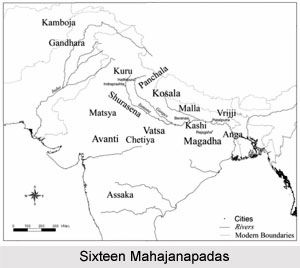 The Vamsa or the Vatsa was the kingdom that followed the monarchical form of government. This kingdom is one of the sixteen Mahajanapadas, and the capital of this was located at Kausambi. It was situated at the northeast of Chedi, and on the bank of river Yamuna. Its most important king was Udayan. It`s capital was Kaushambi, a great commercial center. One very important aspect of this city was that it formed the hub of all economic activities and had a prosperous trade and business relations. 6th century BC has the account of Udyana to be the ruler of the, kingdom at the time of Buddha. About Udayana it is said that earlier there were resentments on his side regarding Buddhism as he was very warlike and aggressive but in the later years became more tolerant and finally a follower of Buddha. So much he was affected by his teachings that he made Buddhism his state religion.
The Vamsa or the Vatsa was the kingdom that followed the monarchical form of government. This kingdom is one of the sixteen Mahajanapadas, and the capital of this was located at Kausambi. It was situated at the northeast of Chedi, and on the bank of river Yamuna. Its most important king was Udayan. It`s capital was Kaushambi, a great commercial center. One very important aspect of this city was that it formed the hub of all economic activities and had a prosperous trade and business relations. 6th century BC has the account of Udyana to be the ruler of the, kingdom at the time of Buddha. About Udayana it is said that earlier there were resentments on his side regarding Buddhism as he was very warlike and aggressive but in the later years became more tolerant and finally a follower of Buddha. So much he was affected by his teachings that he made Buddhism his state religion.



















